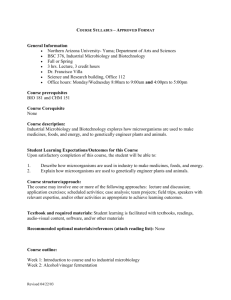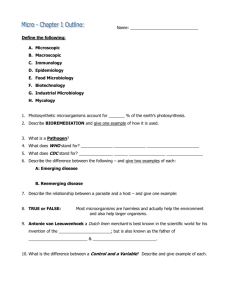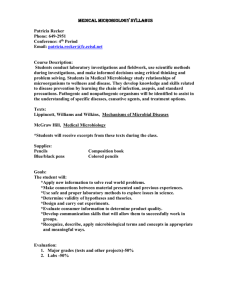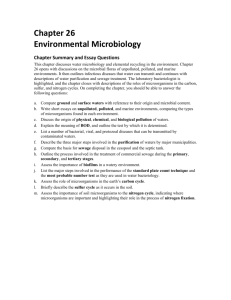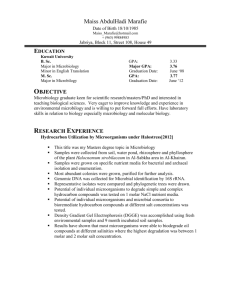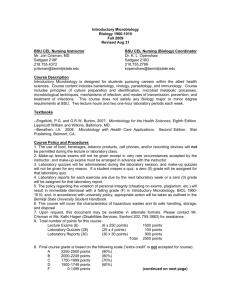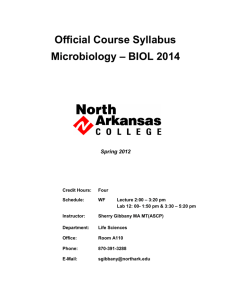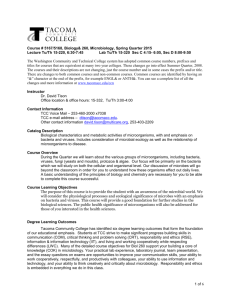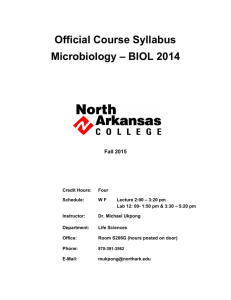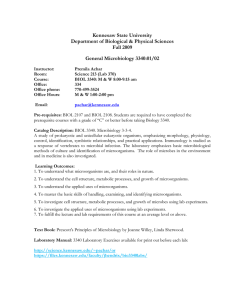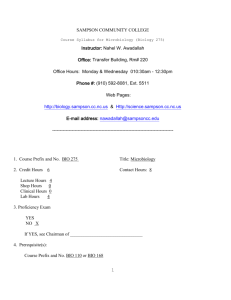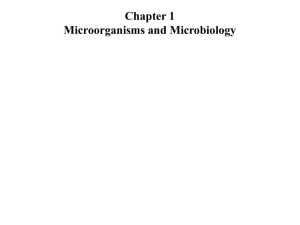Intro to Microbiology 2420
advertisement
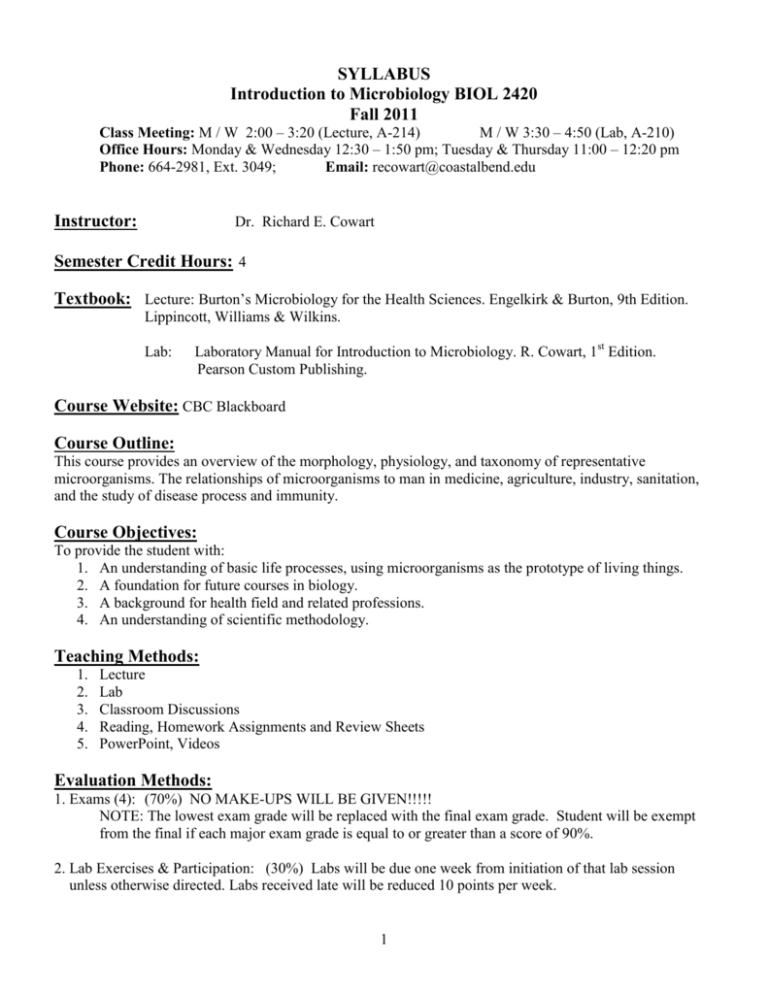
SYLLABUS Introduction to Microbiology BIOL 2420 Fall 2011 Class Meeting: M / W 2:00 – 3:20 (Lecture, A-214) M / W 3:30 – 4:50 (Lab, A-210) Office Hours: Monday & Wednesday 12:30 – 1:50 pm; Tuesday & Thursday 11:00 – 12:20 pm Phone: 664-2981, Ext. 3049; Email: recowart@coastalbend.edu Instructor: Dr. Richard E. Cowart Semester Credit Hours: 4 Textbook: Lecture: Burton’s Microbiology for the Health Sciences. Engelkirk & Burton, 9th Edition. Lippincott, Williams & Wilkins. Lab: Laboratory Manual for Introduction to Microbiology. R. Cowart, 1st Edition. Pearson Custom Publishing. Course Website: CBC Blackboard Course Outline: This course provides an overview of the morphology, physiology, and taxonomy of representative microorganisms. The relationships of microorganisms to man in medicine, agriculture, industry, sanitation, and the study of disease process and immunity. Course Objectives: To provide the student with: 1. An understanding of basic life processes, using microorganisms as the prototype of living things. 2. A foundation for future courses in biology. 3. A background for health field and related professions. 4. An understanding of scientific methodology. Teaching Methods: 1. 2. 3. 4. 5. Lecture Lab Classroom Discussions Reading, Homework Assignments and Review Sheets PowerPoint, Videos Evaluation Methods: 1. Exams (4): (70%) NO MAKE-UPS WILL BE GIVEN!!!!! NOTE: The lowest exam grade will be replaced with the final exam grade. Student will be exempt from the final if each major exam grade is equal to or greater than a score of 90%. 2. Lab Exercises & Participation: (30%) Labs will be due one week from initiation of that lab session unless otherwise directed. Labs received late will be reduced 10 points per week. 1 ATTENDANCE POLICY Class attendance is mandatory and roll will be taken at the beginning of each class meeting. If a student misses 4 classes, they may be dropped from the course and a grade of "Q" given. A student is considered absent if they are not present when roll is taken. If you know in advance that you will miss a class, please contact the instructor. The laboratory meets twice a week as scheduled. You are expected to be available for the complete lab period. Anyone leaving lab early will receive a zero for that lab. Laboratory absences do count toward the total absences. LABORATORY ATTIRE Laboratory safety is of paramount importance and safety rules and regulations are strictly enforced. All students are required to wear closed toed shoes and long pants when in the laboratory. Sandals, flip flops, crocs, and shorts are not acceptable. Any student that does not follow safety rules and regulations, or is not in proper laboratory attire, may be asked to leave the laboratory. STUDENT CONDUCT & DISRUPTIVE BEHAVIOR As stated in the Student Handbook, “All students shall obey the law, show respect for properly constituted authority, and observe correct standards of conduct”. Examples of prohibited acts on college property are: Scholastic dishonesty (“cheating”) and Plagarism Interference with teaching responsibilities through disorderly conduct or disruptive behavior Engaging in any obscene, profane, reckless, destructive, or unlawful course of action. Any student that fails to observe the correct standards of conduct outlined in the student handbook may be told to leave the class and will receive an absence for that day. Any student with chronic misbehavior will be dropped from the class. Excessive talking between students during the course of the lecture is considered disruptive behavior and the students involved can be instructed to leave the class. Chronic excessive talking can result in the students involved being dropped from the class. Any student caught cheating on an exam will receive an immediate zero on that exam. Any student caught assisting another student with his or her exam will also receive an immediate zero on that exam. NON-APPROVED ELECTRONIC DEVICES Non-approved electronic devices are any and all electronic devices that the instructor has not approved for use in the classroom. This includes, but is not limited to, cell phones, iPods, laptop computers, and recorders. If you have any questions as to the acceptability of an electronic device in the classroom, ask the instructor. Some instructors do allow the use of computers and recorders. All non-approved electronic devices must be turned off while the student is in class. Cell phones may be set to vibrate if the student is expecting an important call and the instructor has approved it before class begins. Students using non-approved electronic devices may be asked to leave the classroom and receive an absence for the class, The use of any non-approved electronic device during an exam will be considered cheating, and the student will receive a zero on that exam. GRIEVANCE PROCEDURE Our primary concern is that all students are provided with a productive learning environment in which there is mutual respect. We believe the most productive learning environment is one in which the students feel comfortable enough to freely ask questions and exchange ideas. If you are ever harassed or insulted by another student, bring it to the instructor’s attention immediately. 2 If at any time during the semester you have a complaint or "point of concern", notify the instructor immediately. If you do not feel that the situation can be resolved after bringing it to the instructors attention, you are encouraged to contact the Chairperson of the Science Division at Coastal Bend College, or the Academic Director. Miscellaneous Rules: 1. I respectfully request that all electronic devices be turned off during lecture and lab periods. This includes cell phones, pagers, handheld palm devices and any other potentially distracting device. Cell phones must be turned off and inaccessible during exams. Texting, emailing and similar activities will not be tolerated during lecture or lab. Student in violation of this will be asked to leave the class immediately. 2. Class will start promptly at posted times and according to the clock in the classroom. The door will be locked shut at the start of class at the end of the first week of classes. Students arriving after roll call will be counted absent. 3. I encourage students to utilize the internet site for this textbook along with the Campus Connect online material. There are many study hints and self evaluation tests available at this site. 4. Lecture Exams and Lab Exams cannot be made up if you miss the assigned time for such test. If you miss one the above then you must contact me regarding the situation. If at all possible call me prior to missing the exam for possible alternatives. 5. No extra credit work will be allowed for this course. 6. Students with special needs or disabilities, as outlined in the student handbook, may request assistance from the counseling center or the instructor. CBC strives to accommodate special needs for its students. Lecture Course Content: Section I: Introduction to Microbiology Chapter 1: Microbiology: The Science Chapter 2: Microscopy Section II: Introduction to Microorganisms Chapter 3: Cell Structure & Taxonomy Chapter 4: Diversity of Microorganisms, Part 1: Acellular & Procaryotic Microbes Chapter 5: Diversity of Microorganisms, Part 2: Eucaryotic Microbes Section III: Chemical & Genetic Aspects of Microorganisms Chapter 6: Biochemistry: The Chemistry of Life Chapter 7: Microbial Physiology & Genetics Section IV: Controlling the Growth of Microorganisms Chapter 8: Controlling Microbial Growth in Vitro Chapter 9: Using Antimicrobial Agents to Control Microbial Growth in Vivo Section V: Environmental Microbiology Chapter 10: Microbial Ecology Chapter 11: Epidemiology & Public Health 3 Section VI: Microbiology in Healthcare Facilities Chapter 12: Healthcare Epidemiology: Nosocomial Infections & Infection Control Chapter 13: Diagnosing Infectious Diseases Section VII: Pathogenicity & Host Defense Mechanisms Chapter 14: Pathogenesis of Infectious Diseases Chapter 15: Nonspecific Host Defense Mechanisms Chapter 16: Specific Host Defense Mechanisms; An Introduction to Immunology Section VIII: Infectious Diseases Chapter 17: Major Viral, Bacterial, and Fungal Diseases of Humans Chapter 18: Major Parasitic Diseases of Humans: An Introduction to Medical Parasitology Major Exam Schedule (subject to change): Exam I: Chapters 1-5 Exam II: Chapters 6-9 Exam III: Chapters 10-13 Exam IV: Chapters 14-18 Laboratory content will follow the order of laboratory material as announced in the lab section. 4
